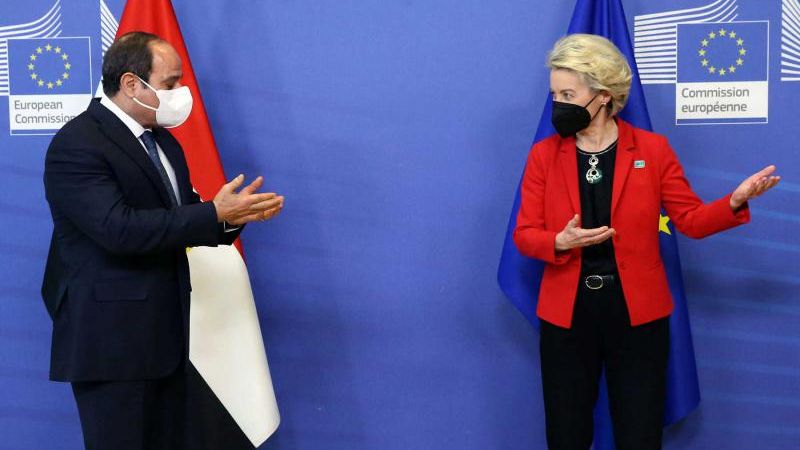President Al-Sisi’s visit to Brussels for the European Union-African Union Summit on 17-18 February 2022 gave him the opportunity to meet with European Heads of States and EU representatives.
EuroMed Rights, along with many other NGOs, had expressed their concern over the whitewashing of al-Sisi’s government’s repressive policies. Despite the outcry not to roll out a red carpet for President al-Sisi, the Egyptian President was praised for his role in maintaining stability in the region and his importance in combating “illegal immigration”, extremism and terrorism. At the same time, Egypt is preparing to host the annual UN Climate Change Conference COP 27 in November 2022. Concerns about Egypt’s authoritarian rule, the repression of civil society, and the human rights crisis unfolding in the country do not seem to be high on some agendas.
Disappointing EU statements
EuroMed Rights and other NGOs have repeatedly called on the EU and its Member States to undertake a comprehensive review of their relations with Egypt. And yet, the newly elected European Parliament’s President, Roberta Metsola, seems to have addressed human rights rather timidly, despite the strong calls laid out in the European Parliament’s urgency resolutions on Egypt of 2019 and 2020.
Once again, statements following meetings with President al-Sisi were disappointing: they failed to take a clear and public position on the government’s unprecedented crackdown on human rights. This stance is counter-productive as it reinforces the sense of impunity that perpetrators of human rights violations already enjoy in Egypt. The joint declaration at the UNHRC 46th session in March 2021, where 32 states “expressed their deep concern over the human rights situation in the country”, including on “the application of terrorism legislation against human rights activists, LGBTI persons, journalists, politicians and lawyers”, should lead the way forward also in terms of public diplomacy.
Time for the EU to correct its stance
The EU’s special treatment towards Egypt is evident from the EU’s appalling submission of a joint bid to co-chair the Global Counter Terrorism Forum with Egypt, although prominent human rights defenders are scapegoated as terrorists and persecuted for their human rights work under anti-terrorism legislation. Worrying trends and indicators from the ground raised by Egyptian civil society organisations are ignored, such as the NGO law, forcing ANRHI’s decision to suspend its activities last January, and the documented reprisals, harassment, arbitrary detention and unfair judicial proceedings against several human rights defenders, including lawyers Ibrahim Metwally Hegazy and Mohamed El-Baqer.
When it comes to Egypt, it seems that the European principle of partnership guided by shared commitments to human rights fades away in the name of a “peace and stability”, which is a short-sighted perspective. This dangerous dichotomy allows al-Sisi’s government to continue its crackdown on human rights in total impunity, hence nourishing instability.
If the EU and its Member States truly want peace, stability and prosperity, it is long overdue for them to address the human rights crisis in Egypt and to finally show policy coherence. The upcoming Partnership Priorities should be the opportunity to finally establish clear benchmarks to measure progress in human rights and the rule of law in the country. The EU Member States should also support the establishment of a UN monitoring and reporting mechanism on Egypt at the upcoming UN Human Rights Council session, to ensure accountability for years of brutal repression.
Selma Rekik,
Support Programme Officer, EuroMed Rights Middle East Unit

